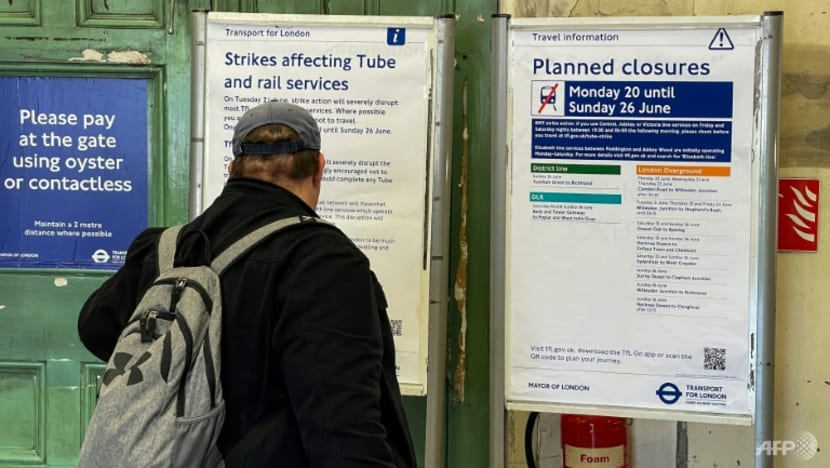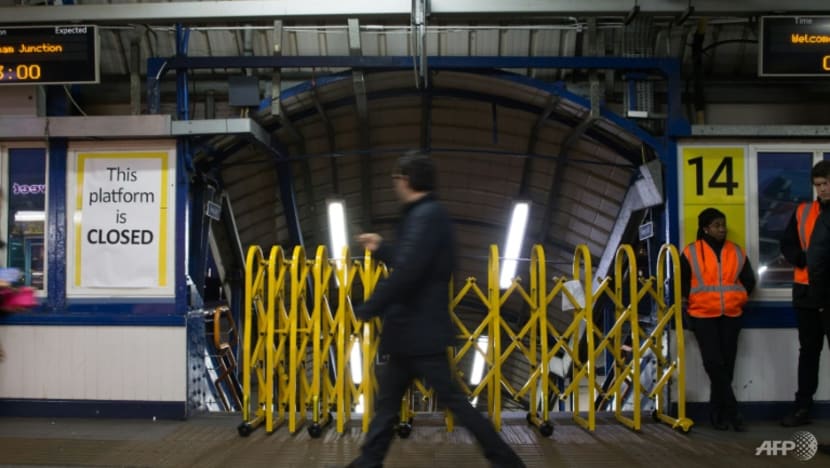Biggest rail strike in 30 years brings UK to standstill


LONDON: Britain's biggest rail strike in 30 years kicked off on Tuesday (Jun 21) as tens of thousands of staff members walked out in a dispute over pay and jobs that could pave the way for widespread industrial action across the economy in the coming months.
Picket lines appeared at dawn and will be lined by some of the more than 40,000 rail workers who are due to strike on Tuesday, Thursday and Saturday, bringing the network to a standstill. The London Underground was also shut due to the strike.
Prime Minister Boris Johnson, under pressure to do more to help British households who face the toughest economic hit in decades, said that the industrial action would harm businesses as they continue to recover from the pandemic.
Unions have said that the rail strikes could mark the start of a "summer of discontent" with teachers, medics, waste disposal workers and even barristers moving towards industrial action as surging food and fuel prices push inflation towards 10 per cent.
"Our campaign will run for as long as it needs to run," Mick Lynch, secretary-general of the Rail, Maritime and Transport Workers (RMT), told reporters on Monday.
Last-ditch talks to avert the strike broke down on Monday, with Lynch describing as "unacceptable" offers of below-inflation pay rises by both overground train operators and London Underground that runs the Tube in the capital.
The prime minister said that the unions were harming the people they claimed to be helping.
"By going ahead with these rail strikes, they are driving away commuters who ultimately support the jobs of rail workers, whilst also impacting businesses and communities across the country," Johnson will tell his Cabinet later on Tuesday, according to his office.
Transport Secretary Grant Shapps said the government was doing everything it could to minimise the expected "mass disruption".
But he told parliament on Monday: "It's estimated that around 20 per cent of planned services will operate, focused on key workers, main population centres and critical freight routes."
The strikes risk causing significant disruption to major events including the Glastonbury music festival.
Schools are warning that thousands of teenagers taking national exams will also be affected.
The strikes are the biggest dispute on Britain's railway network since 1989, according to the RMT.
Rail operators, however, warn of disruption throughout the week, with lines not affected by strike action still having to reduce services.
RMT members on the London Underground are additionally staging a 24-hour Tube train stoppage on Tuesday.
The union argues that the strikes are necessary as wages have failed to keep pace with inflation in the United Kingdom, which has hit a 40-year high and is on course to keep rising
The rail strike means only about half of Britain’s rail network will be open on strike days with a very limited service running on those lines and continued disruption on the days in between strike days.
DESTRUCTIVE INFLATION
Countries around the world are being hit by decades-high inflation as the Ukraine war and the easing of COVID-19 restrictions fuel energy and food price hikes.
Unions warn also that railway jobs are at risk, with passenger traffic yet to fully recover after the lifting of pandemic lockdowns.
Britain's economy initially rebounded strongly from the pandemic, but a combination of labour shortages, supply chain disruption, inflation and post-Brexit trade problems has prompted warnings of a recession.
The government says it is giving extra support to millions of the poorest households but says that above-inflation pay rises would damage the fundamentals of the economy.
"Sustained higher levels of inflation would have a far bigger impact on people's pay packets in the long run, destroying savings and extending the difficulties we’re facing for longer," Johnson said.
The outbreak of industrial action has drawn comparison with the 1970s, when Britain faced widespread labour strikes including the 1978 to 1979 "winter of discontent".
The strikes come as travellers at British airports experience chaotic delays and last-minute cancellations due to staff shortages while many Britons have to wait months for new passports to arrive due to processing delays.
Thousands of workers were sacked in the aviation industry during the pandemic, but the sector is now struggling to recruit workers as travel demand rebounds following the lifting of lockdowns.
Other areas of the public sector are meanwhile set to hold strikes.
The Criminal Bar Association, representing senior lawyers in England and Wales, have voted to strike from next week in a row over legal aid funding.
Justice minister James Cartlidge called the walk-out "disappointing" given that the court system is already battling significant backlogs in cases caused by the pandemic.
Four weeks of action begin on Monday and Tuesday, increasing by one day each week until a five-day strike from July 18.
Teaching staff and workers in the state-run National Health Service are reportedly also mulling strike action.
And several other transport unions are balloting members over possible stoppages that could occur in the coming weeks.










